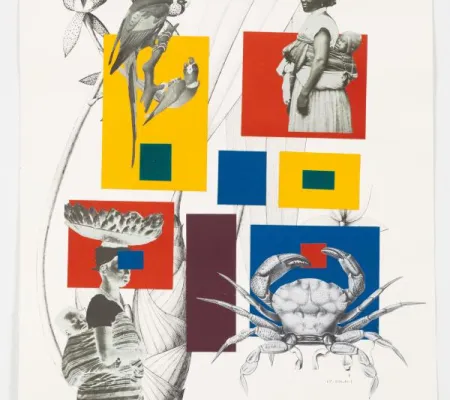10 contemporary artists blur the line between art and activism in a new exhibition of over 60 objects critically engaging with the political and cultural histories of Brazil
AUSTIN, Texas — Presented by the Visual Arts Center at The University of Texas at Austin, Social Fabric: Art and Activism in Contemporary Brazil brings together the work of ten Brazilian artists who reflect upon long-standing histories of oppressive power structures in the territory now known as Brazil. Viewing art as a platform for critical engagement with historical, political, and cultural configurations of a particular place, each of the artists in Social Fabric contribute to both local and global conversations about the state of democracy and violence inflicted by the nation-state. The exhibition will be on view September 23, 2022 – March 10, 2023 and will travel to Brazil where it will be on view at the Museu de Arte Contemporânea da Universidade de São Paulo (Museum of Contemporary Art of the University of São Paulo, MAC USP) in São Paulo in 2023.
Spanning a wide range of media, including installation, painting, performance, photography, sculpture, and video, Social Fabric unfolds over five galleries within the Visual Arts Center and features over 60 artworks and several new commissions. Aline Motta interrogates how memories are formed, forgotten, and revivified at the crossroads of time, while Castiel Vitorino Brasileiro, the VAC’s Fall 2022 artist-in-residence, and Sallisa Rosa explore how healing and justice may be possible through anti-colonial and communal efforts. Brasileiro’s expansive new commission for the VAC, Jupiter is Here. Celestial is Everything. (2022) incorporates locally-sourced materials, allowing Brasileiro to engage with the long histories of Central Texas, merging the distant past with the present. Guerreiro do Divino Amor and Lais Myrrha subvert both historical and contemporary imagery, reminding us that Brazil’s colonial past cannot be divorced from today’s challenges. Utilizing both practical tools and affective objects—from maps to family photographs and typography—Jaime Lauriano, Maré de Matos, and Rosana Paulino examine the ongoing legacies of dispossesion and show how these histories are linked to racism and land exploitation. Denilson Baniwa and Antonio Obá consider the tensions and collisions of different worldviews and foreground other ways of knowing through the body, non-human entities, and place.
In an expansion of the exhibition’s educational aims, Social Fabric will be accompanied by both digital and physical spaces for public engagement. Included among these resources is a website with content devoted to further learning about the exhibition’s artists and histories of Brazil. The exhibition features a library and maker space to allow visitors to deepen their understanding of Brazilian history and contemporary art through a selection of books and catalogues as well as hands-on learning through activities, workshops, and public programs that will be hosted within the gallery. A fully illustrated exhibition catalogue will be published in spring 2023. The catalogue includes texts authored by an international cohort of experts on Brazilian contemporary art and topics addressed within the exhibition. The essays will bring the practices of these ten artists into conversation to elaborate on histories of political art and social activism both in Brazil and North America.
By refusing to remain neutral and shedding light on histories of state-sanctioned oppression and persistent inequity, the artists in Social Fabric provide differing approaches towards activism and forge pathways towards justice and healing. This exhibition, much like Tecido Social (2010), the work of Brazilian contemporary artist Rosana Paulino from which the exhibition takes its title, invites us to imagine anew, stitch by stitch, a more equitable future.
Social Fabric: Art and Activism in Contemporary Brazil is organized by Adele Nelson, Assistant Professor, Art History, UT Austin, and MacKenzie Stevens, Director, Visual Arts Center, with María Emilia Fernández, Curatorial Assistant.
Major support for this exhibition is provided by the Andy Warhol Foundation for the Visual Arts. Lead support provided by the Jedel Family Foundation and Mark and Shannon Hart. Additional support provided by the Center for Latin American Visual Studies (CLAVIS), the Irvin-Loughlin Family Fund, and the VAC Circle.
###
On view
September 23, 2022 – March 10, 2023
Media Contact
Alicia Dietrich
College of Fine Arts
alicia.dietrich@austin.utexas.edu
512-475-7033
High-resolution images are available with caption information at this Box link.


